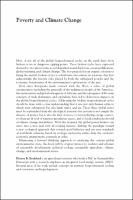Poverty and Climate Change
Proposal review
Restoring a Global Biogeochemical Equilibrium
| dc.contributor.author | Beckford, Fitzroy B. | |
| dc.date.accessioned | 2020-12-15T14:08:25Z | |
| dc.date.available | 2020-12-15T14:08:25Z | |
| dc.date.issued | 2018 | |
| dc.identifier | OCN: 1053888185 | |
| dc.identifier.uri | https://library.oapen.org/handle/20.500.12657/43910 | |
| dc.description.abstract | Most, if not all of the global biogeochemical cycles on the earth have been broken or are at dangerous tipping points. These broken cycles have expressed themselves in various forms as soil degradation and depletion, ocean acidification, global warming and climate change. The best proposal for an organic solution to fixing the myriad broken cycles is a deliberate investment in solutions that first acknowledge the historic roles played by both the subjugated peoples, and the economic beneficiaries of the environmental exploitations of the past. Ever since Europeans made contact with the West, a series of global circumstances including the genocide of the indigenous people of the Americas, the enslavement and global subjugation of Africans, and the emergence of Western concepts of trade dominance and capitalism, have led to deleterious impacts on the global biogeochemical cycles. Addressing the broken biogeochemical cycles should be done with a clear understanding that it was not only human subjects which were subjugated, but also land, water, and air. These three global stores must be replenished from the ideological position that poverty is not simply the absence of money, but is also the lack of access to non-polluting energy sources, to clean air devoid of runaway greenhouse gasses, and to local conditions devoid of climate change instabilities. With this in mind, the global powerbrokers can enter into a new deal with developing nations, shifting the paradigm toward a new ecological approach that rewards good behavior and sets new standards of worldwide relations based on ecologic inclusivity rather than the exclusive economic arrangements currently in order. Harnessing a forward thinking approach to analyzing the current global environmental crisis, this book will be of great interest to students and scholars of sustainable development, political ecology, sustainable agriculture, climate change and environmental justice. | |
| dc.language | English | |
| dc.subject.classification | thema EDItEUR::K Economics, Finance, Business and Management::KC Economics::KCM Development economics and emerging economies | en_US |
| dc.subject.classification | thema EDItEUR::R Earth Sciences, Geography, Environment, Planning::RN The environment::RNC Applied ecology | en_US |
| dc.subject.other | Business & Economics | |
| dc.subject.other | Development | |
| dc.subject.other | Sustainable Development | |
| dc.subject.other | Nature | |
| dc.subject.other | Ecology | |
| dc.title | Poverty and Climate Change | |
| dc.title.alternative | Restoring a Global Biogeochemical Equilibrium | |
| dc.type | book | |
| oapen.identifier.doi | 10.4324/9780429437892 | |
| oapen.relation.isPublishedBy | Taylor & Francis | |
| oapen.relation.isFundedBy | b818ba9d-2dd9-4fd7-a364-7f305aef7ee9 | |
| oapen.relation.isbn | 9781138345416 | |
| oapen.collection | Knowledge Unlatched (KU) | |
| oapen.imprint | Routledge | |
| oapen.identifier | https://openresearchlibrary.org/viewer/99b81052-4555-4f68-8d03-0137f8f18287 | |
| grantor.number | 103996 | |
| peerreview.anonymity | Single-anonymised | |
| peerreview.id | bc80075c-96cc-4740-a9f3-a234bc2598f1 | |
| peerreview.open.review | No | |
| peerreview.publish.responsibility | Publisher | |
| peerreview.review.stage | Pre-publication | |
| peerreview.review.type | Proposal | |
| peerreview.reviewer.type | Internal editor | |
| peerreview.reviewer.type | External peer reviewer | |
| peerreview.title | Proposal review | |
| oapen.review.comments | Taylor & Francis open access titles are reviewed as a minimum at proposal stage by at least two external peer reviewers and an internal editor (additional reviews may be sought and additional content reviewed as required). |

